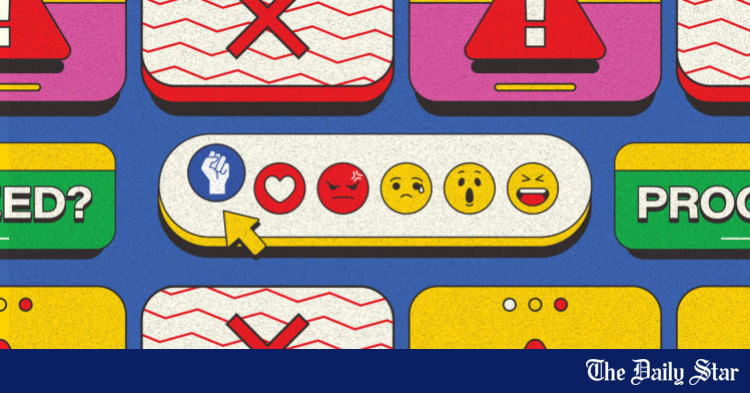Fri Sep 5, 2025 01:00 PM
Last update on: Fri Sep 5, 2025 01:00 PM
Fri Sep 5, 2025 01:00 PM Last update on: Fri Sep 5, 2025 01:00 PM
Social media algorithms are designed to keep us hooked with small doses of dopamine, while flooding our timelines with news designed to anger or upset us. FILE ILLUSTRATION: ZARIF FAIAZ
“>
Social media algorithms are designed to keep us hooked with small doses of dopamine, while flooding our timelines with news designed to anger or upset us. FILE ILLUSTRATION: ZARIF FAIAZ
Once upon a time, the internet was a beautiful place to foster connections with strangers, engage in forums dedicated to niche interests, and discover critical information. That version of the internet has long been dead. Today, the internet, and social media in particular, has become a poisoned well for our psyche, doing more harm than good. What was once a medium for connecting with like-minded people and sharing tidbits of our lives has turned into a nightmare for our safety with the rise of the surveillance state. Everything we cherished about the internet of our childhood and teenage years has faded into obscurity.
In this hyper-fast technological era, where two days offline means missing an entire discourse, it has become rare for us to look up from our dopamine-inducing devices and notice what’s happening around us. We now live in a perpetual present, with no respite for our minds. Boredom has vanished, replaced by constant distraction as we chase the next easily accessible dopamine hit. Our hands are conditioned to reach for our phones the moment we wake. We share every milestone, hundreds of photos from family holidays, and every scrap of information that makes us who we are.

Getting addicted to things has always been easy for us, whether opium, gambling or internet use. Validation on social media is a low-hanging fruit, yet many of us are desperate for it and often mistake it for genuine connection. “Touch grass” has become an insult because so many of us live inside our phones, our identities reduced to pixels on social media platforms, searching for connection with someone thousands of miles away. We yearn to belong to a group to deflect from the horrors of modern life. As a result, an entire generation has grown up seeing the internet, and being online, as integral to life itself. There is now an urgency to take on an online persona and maintain it offline, to the point that many struggle to remember who they were before social media became mainstream. What do we really gain from this? Connections? Opportunities? A sense of belonging?
The most unnerving part of today’s internet is that it makes us reactionary. Social media algorithms are designed to keep us hooked with small doses of dopamine, while flooding our timelines with news designed to anger or upset us. The idea that we must have opinions on everything under the sun is pernicious, uncharitable, and leaves little space for nuance, particularly as the lines blur between the virtual and the real in a world of growing surveillance. Not every breaking story warrants a reaction. In fact, it is unnatural to feel five different emotions in the span of 60 seconds. Increasingly, we cannot even sit with our emotions anymore.
Social media often brings out the worst in people, with the anonymity of many platforms fuelling hostility towards strangers. Consuming hate-filled content poisons our hearts with apathy towards those who may not look or think like us. Engaging only with news and content that affirm our beliefs, while attacking those who challenge them, sets us up for failure. The internet becomes an echo chamber, fuelled by the aggressive algorithms of tech companies, for whom users are nothing more than free products generating endless data to sell to third parties. This dynamic makes people oblivious and insensitive to cultural norms and realities outside their own bubbles. We already see its consequences: consent for mob violence is manufactured online, with truth distorted and marginalised groups targeted.
Overconsumption of mindless content has already shortened attention spans and deteriorated cognitive function—so much so that the 2024 Oxford Word of the Year was “brain rot,” describing the intellectual decline of the chronically online. On top of this, the rise of AI-generated images has worsened the disinformation crisis—no one knows what is real anymore. Worse still, the phenomenon of “AI chatbot psychosis” has fuelled a surge in mental health crises. People with no history of illness are suffering psychosis and breakdowns, while for those with serious mental health conditions, interacting with AI chatbots is proving even more dangerous.
While social media remains a useful tool for staying informed and for community organising, its drawbacks now far outweigh the benefits. We have allowed a device designed to erode cognitive function to steal our time. The profit margins of companies like Meta and X depend on users having knee-jerk reactions to the mildest transgressions. So, before we lose the last remaining shred of our sanity, perhaps it’s time we log off and reconnect with people in real life.
Nawshin Flora is a writer and poet based in Dhaka.
Views expressed in this article are the author’s own.
Follow The Daily Star Opinion on Facebook for the latest opinions, commentaries, and analyses by experts and professionals. To contribute your article or letter to The Daily Star Opinion, see our guidelines for submission.

